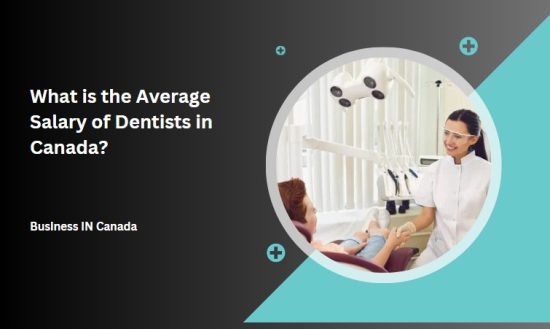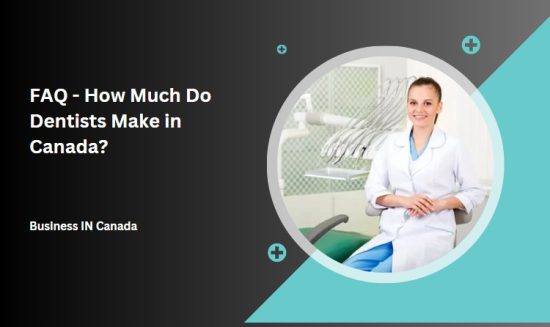Are you considering a career in dentistry and wondering how much dentists make in Canada? Well, wonder no more because we’ve got the answers for you! A career in dentistry is not only rewarding but also lucrative.
However, the salary of a dentist can vary depending on several factors. In this post, we’ll explore everything you need to know about dentist salaries in Canada, including what determines their pay, how to become a dentist, and what kind of salaries junior dentists can expect. Keep reading to find out if a career in dentistry may be right for you!
How Much Do Dentists Make in Canada?

A dentist’s income in Canada might vary depending on numerous criteria, such as region, experience, and specialization.
In Canada, dentists earn a wide range of salaries depending on their experience, location, and the type of practice they work in. As of early 2025, the average annual salary for a dentist is approximately $190,620.
However, this can vary significantly with entry-level positions starting lower and experienced dentists earning substantially more. In certain areas, such as Estevan, SK or 100 Mile House, BC, salaries can reach as high as $400,000 per year, reflecting the demand and regional salary differences
It’s important to note that private practice owners may have additional expenses like office rent and staff salaries, which affect their take-home pay. On the other hand, some salaried positions offer benefits like health insurance and pension plans, which can offset lower wages.
While there is no definitive answer as to how much Canadian dentists make since it varies depending on several factors, it is safe to say that this career path has excellent potential for earning a high income!
The Determining Factors of Dentist Salaries
Dentist salaries can vary depending on a number of factors. Firstly, the location of the dental practice has an impact on earning potential. Dentists in urban areas earn more than those in rural or remote areas.
The type of dental practice is also important. Those who work for themselves and own their private practices have higher earning potential than those who work as employees in corporate or government-run clinics.
Experience level is another factor that affects dentist salaries. Junior dentists typically start at lower salaries but can expect their income to increase with time and experience.
Specialization within dentistry can also affect salary levels. For example, orthodontists typically command higher salaries due to their specialized training and expertise.
Demand for dental services plays a role in determining salary levels. Areas with high demand for dental services may see higher salaries as there are fewer providers available to meet patient needs.
While these factors play a role in determining dentist salaries, it’s important to remember that each individual’s earning potential will ultimately depend on their particular circumstances and career choices within the field of dentistry.
Is a Career in Dentistry Right for You?

Dentistry is a challenging yet rewarding career path that requires years of education, training, and hard work. Before pursuing a career in dentistry, it’s important to assess whether it’s the right fit for you.
- Firstly, consider if you enjoy working with your hands and have strong attention to detail. Dentists must perform precise procedures, such as filling cavities or root canals, requiring excellent manual dexterity.
- Secondly, think about your communication skills. As a dentist, you’ll be interacting with patients regularly and must be able to explain complex dental concepts in simple terms while also being empathetic toward their concerns.
- Thirdly, reflect on your passion for continued learning. The field of dentistry is constantly evolving, with new technologies and techniques emerging regularly. Therefore, dentists must keep up-to-date by attending medical profession development courses throughout their careers.
Consider the financial investment required for dental school tuition fees, which can be costly but often leads to high earning potential in the long run.
It’s crucial to evaluate whether a dentistry career aligns with your personal interests and professional goals before embarking on this journey.
How to Become a Dentist in Canada?
Becoming a dentist in Canada requires a combination of education, licensing, and practical experience. Below is a step-by-step guide to help you understand the process.
1. Complete High School with Required Subjects
To be eligible for dental school, you need a strong academic background in high school, particularly in:
- Biology
- Chemistry
- Physics
- Mathematics
- English
Most dental schools in Canada require at least two years of post-secondary education, though some prefer a completed bachelor’s degree.
2. Obtain a Bachelor’s Degree (Pre-Dentistry)
Although some dental schools accept students with only two years of undergraduate study, most applicants complete a Bachelor of Science (B.Sc.) degree with a focus on biology, chemistry, or a related field.
- Ensure that your courses meet the prerequisite requirements for dental school.
- Maintain a high GPA (typically 3.5 or higher) to be competitive.
3. Take the Dental Aptitude Test (DAT)
The Dental Aptitude Test (DAT), conducted by the Canadian Dental Association (CDA), is a mandatory exam for dental school admission.
The test includes:
- Natural Sciences (Biology & Chemistry)
- Perceptual Ability
- Reading Comprehension
- Manual Dexterity Test (in some cases)
4. Apply to an Accredited Dental School in Canada
Once you have completed your undergraduate studies and taken the DAT, you can apply to a Doctor of Dental Medicine (DMD) or Doctor of Dental Surgery (DDS) program.
Some top dental schools in Canada include:
- University of Toronto (U of T)
- University of British Columbia (UBC)
- McGill University
- University of Alberta
- Western University
The program typically lasts four years, covering:
- Dental sciences
- Clinical training
- Practical experience
5. Complete Licensing Requirements
After completing dental school, you must obtain a license from the National Dental Examining Board of Canada (NDEB).
Licensing includes:
- Written Exam
- Objective Structured Clinical Examination (OSCE)
Passing these exams allows you to practice dentistry anywhere in Canada.
6. Obtain Provincial or Territorial Licensure
In addition to passing the NDEB exams, you must register with your provincial or territorial dental regulatory authority to legally practice.
Each province has its own regulatory body, such as:
- Royal College of Dental Surgeons of Ontario (RCDSO)
- College of Dental Surgeons of British Columbia (CDSBC)
7. Consider Specialization (Optional)
If you wish to specialize in fields like orthodontics, oral surgery, or periodontics, additional postgraduate training (2-6 years) is required.
- Specializations are accredited by the Royal College of Dentists of Canada (RCDC).
- You must pass the National Dental Specialty Examination (NDSE).
8. Gain Practical Experience or Open a Practice
Once licensed, dentists can:
- Work in private clinics or hospitals.
- Join established dental practices.
- Open their own dental clinic.
- Pursue academic or research roles in dentistry.
What is the Average Salary of Dentists in Canada?

The average salary of dentists in Canada varies based on experience, location, and specialization. As of 2025, the average annual salary for a dentist in Canada is $190,620, which breaks down as follows:
- Monthly salary: $15,885
- Weekly salary: $3,666
- Hourly wage: $94.93
Salary Range
- Lowest salary: $185,241 per year
- Highest salary: $193,438 per year
How Much Do Junior Dentists Make in Canada?
Junior dentists in Canada are typically recent graduates who have just completed their dental education and are starting their careers. As such, they can expect to earn less than more experienced dentists. However, the salary for a junior dentist in Canada is still quite competitive.
According to PayScale, the average salary for a junior dentist in Canada is around $130,000 per year. However, this figure may vary depending on factors such as location, type of practice and years of experience.
It’s worth noting that many newly graduated dentists begin their careers by working as associates or assistants with established practices before branching out on their own. During this time, they gain valuable experience while earning a steady income.
While the salary of a junior dentist may be lower than that of an experienced practitioner, it’s still an attractive career path with plenty of opportunities for growth and development over time.
Conclusion
As we’ve explored, the average salary of dentists in Canada depends on various factors such as experience, location, and specialty. But, being a dentist is generally a lucrative career with high earning potential.
If you’re considering dentistry as a profession, it’s important to consider your interests and strengths. Ask yourself if you enjoy working with people and have strong communication skills. Are you detail-oriented and comfortable working with technology? These are some qualities that could make for a successful dentist.
Becoming a dentist in Canada requires hard work and dedication. First, you’ll need to complete an undergraduate degree followed by at least four years of dental school training. After graduation, you must also pass certification exams before obtaining your license.
While the journey toward becoming a dentist may seem daunting, it can be rewarding financially and personally for those passionate about oral health care. If this sounds like something you’re interested in pursuing further, don’t hesitate to research what it takes to become a dentist in Canada.
FAQ – How Much Do Dentists Make in Canada?

Which type of dentist gets paid the most?
When it comes to dental specialties, some tend to earn more than others. This is because certain types of dentists require additional education and training, which can lead to a higher salary.
Orthodontists are among the highest-paid dental specialists in Canada. They specialize in correcting teeth and jaw misalignments using braces or other orthodontic appliances. Since this field requires additional training beyond general dentistry, they command a higher salary.
Another highly paid specialty is oral and maxillofacial surgery. These specialists perform complex surgeries on the mouth, jaws, face, and neck. The extensive surgical procedures required for this field mean that these professionals earn high salaries.
Periodontists also tend to make a good income due to their specialized expertise in treating gum diseases and performing surgeries on gums and bones that support the teeth.
Generally, general dentists also have competitive salaries as they provide a range of services from routine cleanings to fillings or extractions; however, they may not earn as much as those who specialize in specific areas such as orthodontics or oral surgery.
No matter what type of dentist you become – be it an endodontist or prosthodontist – there is potential for a lucrative career with hard work and dedication.
How long is dental school in Canada?
Dental school in Canada is a rigorous and demanding program that requires years of dedication and hard work. The length of time it takes to complete dental school can vary depending on the type of program you choose.
There are two main types of dental programs in Canada: the traditional four-year Doctor of Dental Medicine (DDM) degree and the three-year Bachelor’s degree, followed by a four-year DDM degree. These programs are offered at various universities across Canada.
The traditional four-year DDM program consists of classroom lectures, laboratory sessions, and clinical rotations. Students learn about oral health, anatomy, pharmacology, and other topics relevant to dentistry.
The three-year Bachelor’s degree followed by a four-year DDM program is designed for students who do not have an undergraduate degree in science or who want to change careers later in life. This program provides students with foundational coursework before moving on to the more advanced dental curriculum.
Completing dental school can take anywhere from seven to eleven years, depending on your program type. However, once you graduate and become licensed as a dentist in Canada, your earning potential is quite high, making all those years worth it!
What is the highest paid doctor?
When it comes to the highest-paid doctors, a few specialties tend to lead the pack. One of these is neurosurgery, which involves complex brain and nervous system surgeries. Neurosurgeons earn well into six figures per year due to the high expertise required for this field.
Another specialty that tends to have high earning potential is cardiology. Cardiologists focus on diagnosing and treating heart conditions, ranging from minor issues like arrhythmias all the way up to serious problems like heart attacks. With an aging population and increasing rates of heart disease worldwide, the demand for cardiologists remains strong.
Which country pays dentists the most?
When it comes to which country pays dentists the most, Unites States currently tops the list with an average annual salary of $219,600.










